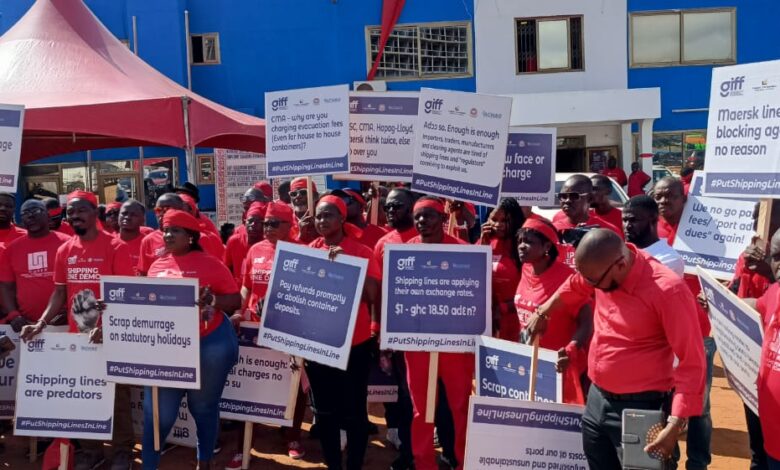The Exploitative Practices Must Stop – Freight Forwarders in Ghana Protest Against Shipping Lines

Freight forwarders across Ghana staged a significant protest on Friday, uniting under the banners of the Association of Customs House Agents of Ghana, the Freight Forwarders Association of Ghana, and the Customs Brokers Association of Ghana, alongside various trade coalitions.
The peaceful demonstration aimed to highlight the burdensome fees and exploitative practices imposed by international shipping lines that threaten the nation’s economy and logistics sector.
Wielding placards with messages such as “unfair D&D charges are crippling businesses” and “shipping lines are predators,” the protesters marched through the streets, calling for immediate reforms.
The demonstrators voiced frustration over excessive demurrage charges and administrative fees, urging shipping companies to eliminate additional costs that they deem unjust.
“The shipping lines have ignored our concerns for over a decade,” stated the former President of the Ghana Freight Forwarders Association, Kwabena Ofosu-Appiah, during a media briefing.
He emphasized that these foreign-owned shipping lines are taking advantage of local businesses, contributing to rising costs for consumers and stifling economic growth.
Despite multiple meetings between freight forwarder representatives and shipping line management, the concerns raised have largely gone unaddressed, prompting the coalition to escalate their actions.
The association highlighted that the shipping lines’ practices often force local businesses to increase prices, further burdening Ghanaians.
“These high charges are killing our industry, we cannot even bring in more containers.”
According to him, “These shipping lines have ignored our concerns for over a decade.”
He revealed alarming statistics indicating that in 2021 alone, shipping lines collected over 781 million Ghanaian Cedis in illegitimate local administrative fees, a figure that has significantly increased since then.
These fees are charged per bill of lading rather than per container, contributing to the rising costs of importation that have become unpredictable.
Further compounding the issue, the practice of charging additional fees, such as container cleaning and empty container fees, has created a hostile business environment.
The protesters highlighted that many traders have been forced into debt due to these excessive charges, with some abandoning their cargo at the ports.
The protest was also a response to the increasing dominance of shipping lines in the freight forwarding business, a practice that the former President of the Association described as a clear violation of Ghana’s customs regulations.
“This has put local businesses at a disadvantage, as these shipping lines offer waivers on fees for those who engage them for customs services, further squeezing independent freight forwarders.”
The coalition of freight forwarders submitted formal petitions to key government officials, including the Ministers of Transport, Trade, and Finance, as well as the Speaker of Parliament and the Ghana Shippers’ Authority. Their demands include:
1. The abolishment of all arbitrary and unjustifiable fees, including local administrative charges and container cleaning fees.
2. The elimination of demurrage charges on weekends and public holidays.
3. Negotiation of shipping lines’ charges with the Ghana Shippers’ Authority as required by regulations.
4. A refund of all unjustified fees previously collected from shippers and freight forwarders.
5. Provision of 24-hour services by shipping lines to ensure timely processing of goods, especially during weekends and public holidays.
6. The cessation of charging fees in U.S. dollars.
As the protest concluded, the coalition pledged to continue advocating for these changes, emphasizing the urgent need for equitable practices that support local businesses and the broader economy.
“Our community remains steadfast in its commitment to ensuring that operations in Ghana adhere to the highest standards of efficiency, fairness, and cost-effectiveness,” they stated, demanding action within the next 14 days.
As the protest concluded, the coalition pledged to continue their advocacy until their demands are met, emphasizing the critical need for equitable practices that support local businesses and the economy.
By PROSPER AGBENYEGA




